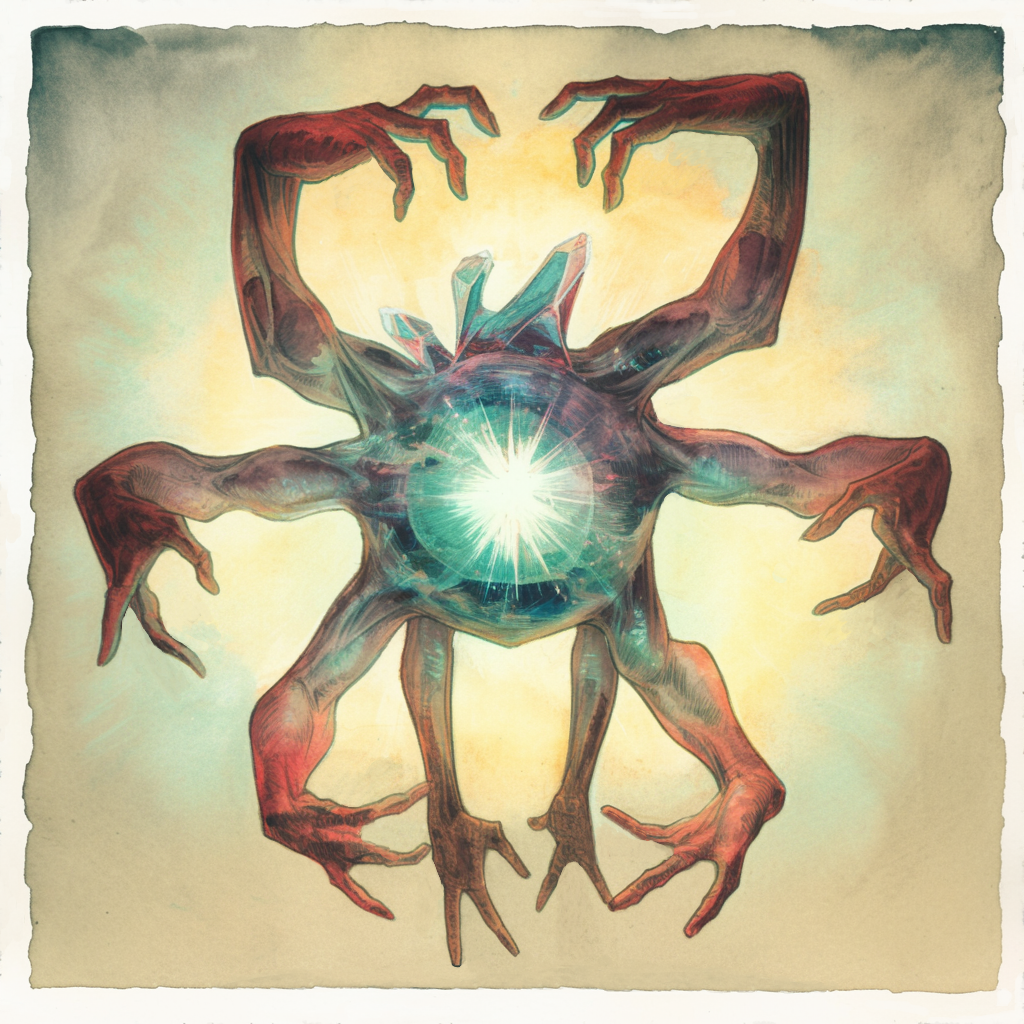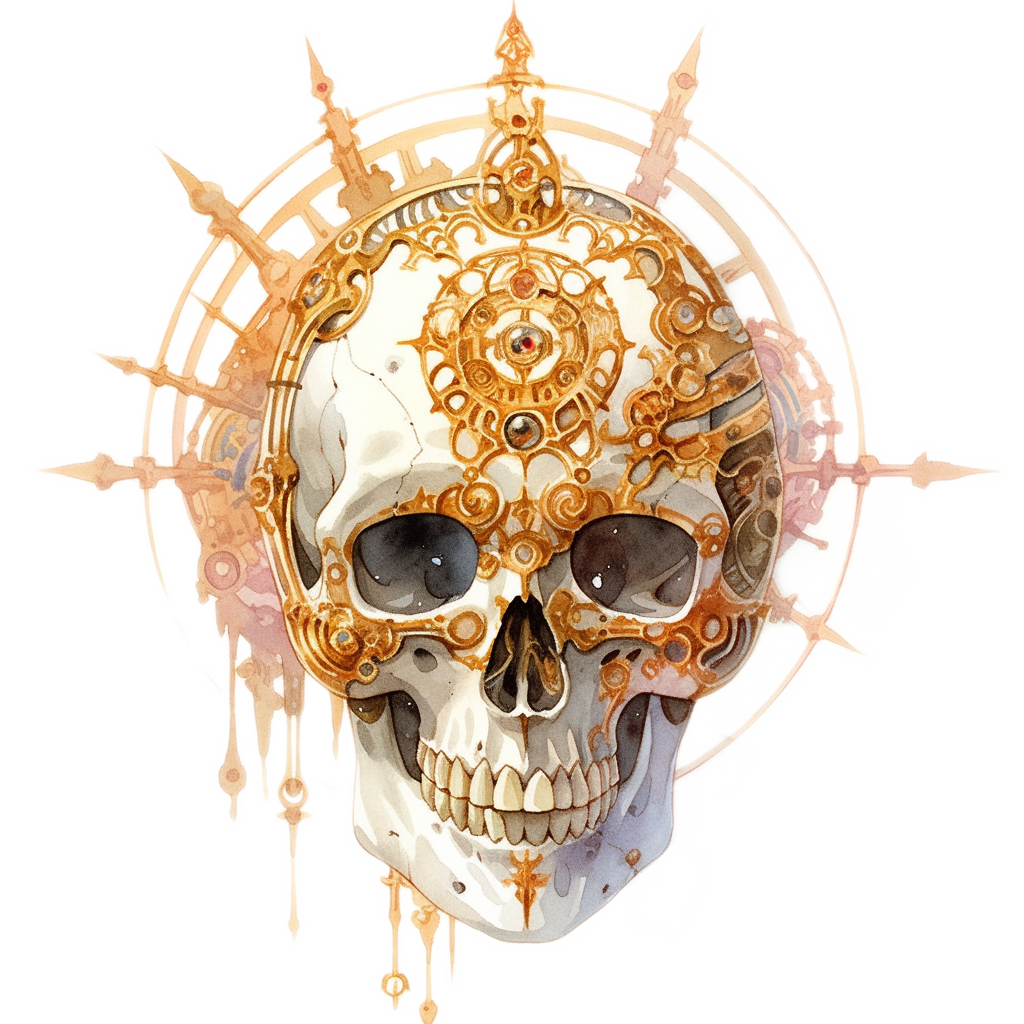[ Aeons | Axiomites | Inevitables ]
[ Agnoia | Akhana | Bythos | Caen | Lipika | Othaos | Paracletus | Pleroma | Synesis | Theletos ]
Theletos Aeon
Who monitor the balance between free will and predetermination.
LN; CR 7 [PF1e], Creature 7 [PF2e]

Theletos aeons are strikingly strange crystalline entities, their roughly spherical bodies composed of faceted, shimmering crystal that refracts light in dazzling patterns. Extending from their forms are four limbs, each splitting at the elbows into two smaller branches that end in three-fingered hands. Two additional tentacle-like appendages emerge from their bodies when required, to act as conduits for the theletos’ unique power of disorienting cutters with the overwhelming duality of fate and free will.
The origin of the theletos lies in the aeons’ mission to maintain balance across all aspects of the multiverse, as dictated by the Monad. Created from the cosmic interplay between freedom and destiny, theletoses emerged to ensure that neither force overwhelms the other in the multiverse. They are particularly drawn to areas where this balance is threatened—regions with oppressive laws or unchecked anarchy—and intervene to restore equilibrium. Unlike other aeons that focus on abstract principles or physical phenomena, theletoses are deeply involved in mortal societies, shaping events and decisions to align with their purpose. Their presence is often subtle but can have profound consequences, as they manipulate individuals and systems to preserve the delicate tension between choice and inevitability.
Philosophically, theletos aeons embody one of the most important dualities: freedom versus fate. They view these forces as complementary aspects of existence that must coexist in harmony. To a theletos, absolute freedom is as undesirable as complete predestination. Their interventions reflect this impartiality—they might liberate a slave in one moment and enforce a binding oath in another, depending on what is required to maintain balance. Theletoses are also guardians of prophecy and destiny, allowing some seers glimpses into possible futures while denying others this privilege without explanation. Their actions often seem capricious to mortals, but the aeons operate on a level of reasoning beyond mortal comprehension, guided solely by their mission to preserve equilibrium.
It is not known whether theletos aeons and other beings of fate and destiny like the Norns or Shekinester ever interact—it seems likely that such powerful beings operate according to their own agenda and are not troubled by theletos meddling.
The abilities of a theletos reflect its role as an arbiter of fate and free will. With its tentacles it can inflict Fate Draining, a kind of curse that stupefies its victims and prevents them from benefiting from good fortune. Its most potent ability, Wrath of Fate, releases a cone of energy that overwhelms creatures with visions of potential futures, leaving them slowed as they are forced to confront both infinite possibilities and inevitable outcomes. Theletoses also communicate through Envisioning, a form of psychic projection that transcends language but often conveys cryptic or mysterious messages. These abilities make them formidable entities capable of influencing both individuals and entire societies while remaining true to their impartial mission.
For planewalkers encountering a theletos aeon, understanding its goal is essential to navigating its enigmatic interventions. Theletoses care little for personal relationships or societal norms; their only concern is maintaining balance between freedom and fate. Planewalkers who disrupt this balance—whether by imposing tyranny or fostering unchecked chaos—may find themselves targeted by a theletos’ manipulations. While their actions may seem contradictory or harsh, planewalkers should remember that theletoses act not out of malice but out of an unyielding dedication to preserving one of the multiverse’s most fundamental dualities.
Sources: Bestiary 2 [PF1e] p14; Bestiary 2 [PF2e] p8
Canonwatch: Theletos is the personification of self-will, according to Gnosticism.


